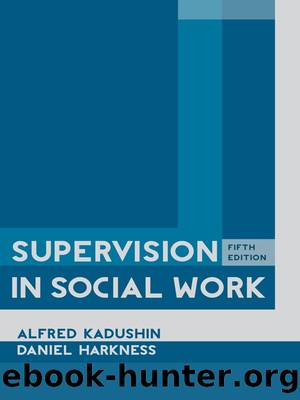Supervision in Social Work by Kadushin Alfred.;Harkness Daniel.;

Author:Kadushin, Alfred.;Harkness, Daniel.; [Kadushin, Alfred.;Harkness, Daniel.;]
Language: eng
Format: epub
Tags: -
ISBN: 9780231525398
Publisher: LightningSource
Published: 2014-01-31T06:00:00+00:00
The change in position may also require, at times, a change in language usage from expressions that connote egalitarian relationships to others that communicate a sense of hierarchy. Statements such as âI might suggest that you â¦â or âI would encourage you to â¦â suggest a relationship of mutuality. At some point, the objectively hierarchical nature of the supervisor-supervisee relationship might need to be expressed in more direct language, such as âI expect you to â¦â or âI am telling you that. â¦â To use the softer language when the supervisor has been directed to get certain procedures or objectives implemented leaves the supervisee with a sense of ambiguity as to what he or she is required to do (Furlong 1990). Regarding performance expectations, Paul and her colleagues (2009:333) said that âcommunication should be clear and consistent, using direct and unambiguous language.â
The change from a clinical to a managerial cast of mind applies to changes in thinking about the supervisee as well as the client. Holloway and Brager (1989) pointed to the fact that beginning supervisors trained as clinicians and oriented toward psychological theories tend to focus on idiosyncratic behavior of supervisees as explanatory variables, although in clinical settings perhaps experienced supervisors continue to maintain such a focus (Frawley-OâDea and Sarnat 2001). Although still needing to be sensitive to these factors, the new supervisor also needs to give explicit recognition to the organizational context, roles, and status of supervisees as sources of explanation for superviseesâ behaviors (Holloway and Brager 1989:29).
Changes in Peer Relationships
Becoming a supervisor requires change in the workerâs relationship with others in the agency (Blankman, Dobrof, and Wade 1993; Salus 2004). The supervisor is no longer a member of the peer group of direct service workers. He or she has become one of âthem.â Not only is the new supervisor deprived of what may have been a satisfying source of pleasure and support, but he or she is further penalized by feelings of rivalry and jealousy from former colleagues. There may be âa certain feeling of distance that I had arrived and they hadnâtâ or âthat I was doing better than themâ (Woodcock 1967:69). One new supervisor said:
Oneâs colleagues like to see a person get ahead all rightâbut not too far ahead, and not too fast. If fortune seems to be smiling too often and too broadly on one person, his friends begin to sharpen their knives to even up the score a bit. I was philosophical about this, as by this time I realized that an occasional knife in the ribs goes with supervision just as June bugs go with June and must be accepted as stoically; I marked my promotion by buying a bigger brief case, enrolling in an advanced seminar in supervision, and having a drink with a few sympathetic friendsâalso supervisors. (H.C.D. 1949:162)
Download
This site does not store any files on its server. We only index and link to content provided by other sites. Please contact the content providers to delete copyright contents if any and email us, we'll remove relevant links or contents immediately.
Cecilia; Or, Memoirs of an Heiress — Volume 1 by Fanny Burney(32533)
Cecilia; Or, Memoirs of an Heiress — Volume 2 by Fanny Burney(31931)
Cecilia; Or, Memoirs of an Heiress — Volume 3 by Fanny Burney(31923)
The Great Music City by Andrea Baker(31907)
We're Going to Need More Wine by Gabrielle Union(19028)
All the Missing Girls by Megan Miranda(15912)
Pimp by Iceberg Slim(14473)
Bombshells: Glamour Girls of a Lifetime by Sullivan Steve(14043)
For the Love of Europe by Rick Steves(13840)
Talking to Strangers by Malcolm Gladwell(13338)
Norse Mythology by Gaiman Neil(13327)
Fifty Shades Freed by E L James(13224)
Mindhunter: Inside the FBI's Elite Serial Crime Unit by John E. Douglas & Mark Olshaker(9307)
Crazy Rich Asians by Kevin Kwan(9268)
The Lost Art of Listening by Michael P. Nichols(7485)
Enlightenment Now: The Case for Reason, Science, Humanism, and Progress by Steven Pinker(7302)
The Four Agreements by Don Miguel Ruiz(6735)
Bad Blood by John Carreyrou(6606)
Weapons of Math Destruction by Cathy O'Neil(6253)
